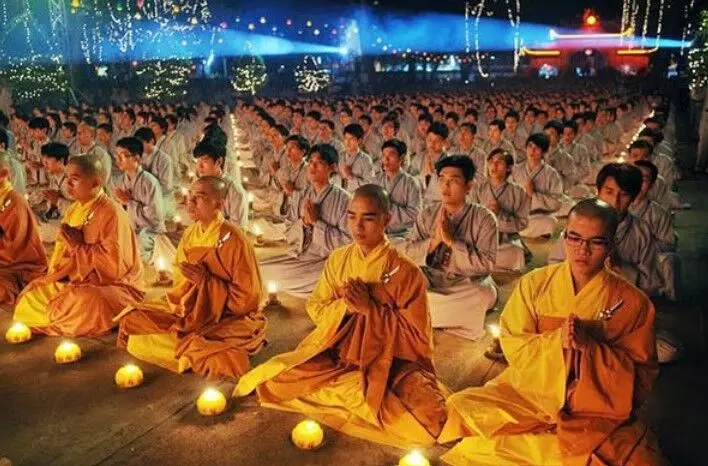Vietnamese Buddhism: Sacred Temples and Practices

Discover Vietnamese Buddhism through sacred temples & spiritual practices—Religious peace and historic traditions!
Vietnamese Buddhism is widespread all over the country, from the Marble Mountains to the bustling city. Vietnam Travel Packages allows you to explore and experience the beauty of Buddhism in Vietnam through various Buddhist temples.
Buddhism in Vietnam holds a profound significance, it is a cultural identity that has shaped its spiritual landscape over the years. one of the major religions practiced in Vietnam, Buddhism permeates its people’s everyday life, offering guidance, peace, and a path to enlightenment to millions of believers across the nation. From ancient rituals passed down through generations to modern interpretations of Buddhist teachings, Buddhism in Vietnam continues to evolve while retaining its core values. Let's dive into the historic Buddhist temple of Vietnam that offers a unique glimpse into the depth and beauty of Vietnamese spirituality
Unveiling Buddhist Temples in Vietnam:
1. Perfume Pagoda in Hanoi -
One of the holiest pilgrimage destinations in Vietnam, the Perfume Pagoda is located in the Huong Tich Mountain.
Thousands of followers travel long distances to the pagoda every year in search of enlightenment and blessings.
To get to the Perfume Pagoda complex, take a scenic boat trip along the Yen Stream. From there, stroll through verdant trees and sharp rock formations, this leaves you to this temple.
Pilgrims come across numerous historic temples and shrines along the route, each with a unique spiritual significance.
The Huong Tich Cave, which houses an effigy of the Bodhisattva Quan Am, is the major attraction of the Perfume Pagoda complex.
With the help of flickering candles, pilgrims make their way deep into the cave to pray and ask for blessings for themselves and their loved ones.
This temple is a must-visit among the many temples in Vietnam, it showcases the real enduring strength of Buddhism in Vietnam.
2. Thien Mu Pagoda in Hue
In the royal city of Hue, the Thien Mu Pagoda is a highly regarded symbol of Vietnamese Buddhism, located above Ha Khe Hill with a panoramic view of the Perfume River.
The meaning of its name, Thien Mu means “Celestial Lady,” and originates from a story about the mother of the Buddha making an appearance on the hill where the temple is currently located.
The temple was constructed in the early 17th century and has seen centuries of development of Buddhism in Vietnam.
Famous for its plethora of historic treasures and artifacts, Thien Mu Pagoda is home to a large bronze bell that was cast in 1710 as well as a stone stele that was installed in 1715.
Inside the temple’s walls, these artifacts offer an insight into Vietnam’s rich cultural and religious history.
At Thien Mu Pagoda, visitors can participate in meditation and prayer rituals led by resident monks, immersing themselves in the tranquil atmosphere of the temple grounds, and the surrounding Perfume river and countryside.
3. Tran Quoc Pagoda in Hanoi
Located on a small island in Hanoi's West Lake, the Tran Quoc Pagoda is highly loved and respected by Vietnamese Buddhists.
Built-in the 6th century, it is the oldest Buddhist temple in the nation’s capital and is a valued symbol of Buddhism's ongoing influence in Vietnam.
Tran Quoc means “Stabilizing the Nation,” which reflects its historical role in fostering unity and peace.
The Tran Quoc Pagoda is also a wonder of architecture. Its elaborate carvings and reddish wood pillars demonstrate a combination of Vietnamese and Buddhist forms of architecture.
A peaceful perception of beauty develops as the 11-tiered pagoda tower, decorated with Buddha sculptures, rises magnificently against the sparkling lake.
Visitors to Tran Quoc Pagoda can partake in various spiritual practices, including meditation, prayer, and offerings.
One of the highlights for visitors is the opportunity to witness Buddhist rituals performed by the monks, offering insight into the rich spiritual traditions of Vietnam.
4. Linh Phuoc Pagoda in Dalat
Situated among the foggy hills of Dalat, the Linh Phuoc Pagoda is a homage to the creativity and innovative thinking of Vietnamese Buddhist artisans.
Constructed in the middle of the 1900s, the pagoda is well-known for its elaborate mosaic paintings, which are created from millions of shattered glass and pottery pieces.
The magnificent statue of Buddha, which is over 49 feet tall and covered in colorful mosaic tiles, is one of the major attractions of the place.
Surrounding the statue are beautifully designed structures, each featuring vibrant marble murals that narrate stories from Buddhist scripture.
The serene gardens of Linh Phuoc Pagoda are the venue for many meditation sessions, which are intended to foster mindfulness and inner calm.
Visitors can also explore the pagoda’s various halls and pavilions, admiring the exquisite craftsmanship of its artwork and gaining insight into the teachings of Buddhism.
5. Vinh Nghiem Pagoda in Ho Chi Minh City
Located in the downtown area of Ho Chi Minh City, Vinh Nghiem pagoda is a representation of Buddhism in Vietnam.
Constructed in the 1900s, the Buddhist structure serves as a symbol of spiritual serenity among the chaos of the city, providing an escape for those looking for peace of mind.
The pagoda’s serene ambiance and lush gardens provide an oasis of tranquility in the heart of the bustling city, inviting visitors to pause and reflect on life’s deeper truths.
Vinh Nghiem Pagoda’s architecture combines modern and traditional Vietnamese design features.
It has a soaring design, detailed wood carvings, and colorful murals that depict scenes from Buddhist texts.
Visitors to Vinh Nghiem Pagoda can participate in meditation sessions, learning techniques to conquer inner peace and balance.
Apart from that, numerous community involvement events, such as charity campaigns, cultural festivals, and educational initiatives that follow Buddhist principles, are held in the pagoda's large courtyard.
Conclusion:
Vietnamese Buddhism has left an indelible mark on the nation’s culture, shaping spiritual practices and inspiring temples that continue to attract visitors from around the world. exploring these temples promises a deeper understanding of Vietnamese culture and the timeless wisdom of Buddhism in Vietnam.














